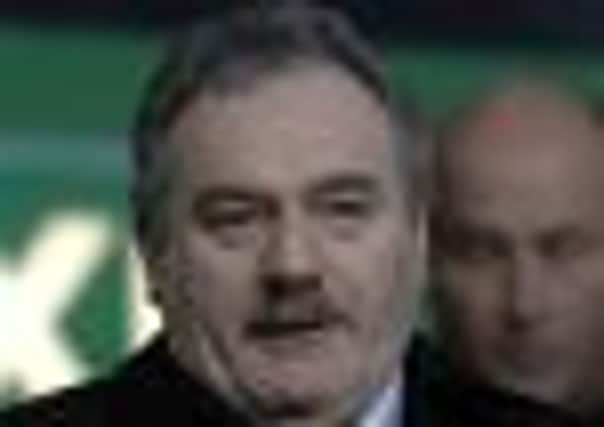Glenn Gibbons: Petrie has proved his worth as chairman


Were the old Philadelphia brainbox around today, contemplating life’s verities in a world changed beyond recognition, he might have been moved to amend his short list to include the assurance of a stampede of managers of every hue – from wannabes to veterans – straining to fill a vacancy that most “normal” people would consider about as appealing as opening the door to a gunman.
On the basis of that inviolable truth, the least surprising revelation to emerge during a very trying week for Hibernian was the news from the Easter Road club’s besieged chairman, Rod Petrie, that, within 48 hours of Colin Calderwood’s dismissal, more than 40 prospective successors had made their candidacy known. If the board of directors waited long enough, it is entirely probable that the line of aspirants would cover the perimeter of the stadium.
Advertisement
Hide AdAdvertisement
Hide AdOnly a very short distance behind the item about the would-be appointees – in terms of no-shock content, that is – came the assertion from the Hibs owner, Sir Tom Farmer, that Petrie is the best chairman the club could have.
This was especially welcome, since it provided blessed relief from the conspicuously uninformed and largely ill-considered comments of the former players and self-important “supporters” inevitably trotted out on these occasions by a fevered media. These mouthpieces almost invariably achieve nothing other than a betrayal of their own ignorance.
Farmer’s testimonial to Petrie’s capabilities was no surprise because, unlike the more hysterical critics, he has a proper insight into the chairman’s work and a deep appreciation of the all-embracing nature of the job. He has also been aware for the last 20 years or so that Petrie’s emotional attachment to the club has precluded his earning much more money elsewhere in the business sector.
If the primary source of fans’ frustration with events at Easter Road in recent times is their plummet to second-bottom place in the SPL, along with the worrying absence of signs of pulling out of the dive, it should be borne in mind that the performances of the team do not fall within the chairman’s remit.
There is certainly an indirect correlation between his office and on-field achievement (or lack of it) in the sense that he is one of the directors who appoint the manager – with the emphasis on ‘one of’’, as opposed to his being the sole hirer and firer – but Petrie’s main responsibilities are concerned with the prudent and protective management of the business.
And if there has been an unhealthily high number of occupants of the managerial chair – eight in the past decade – it tends to reflect the difficulties involved in making such appointments. No board of directors can possibly be certain of whether a manager will live up to the impression made during an interview or fulfil the potential promised by his curriculum vitae.
This is a difficulty not peculiar to Easter Road, as others, such as Aberdeen, Hearts and even Celtic and Rangers, have demonstrated down through the years. In the present situation, there has been, too, an unmistakable hypocrisy among a number of Easter Road fans in the matter of carping over managers.
Of the eight, two were head-hunted by other clubs and at least another three were so unpopular that their departures brought widespread relief.
Advertisement
Hide AdAdvertisement
Hide AdAnother couple appear to have departed for reasons that remain a little mysterious, although it is not outrageous to infer that there had been conflict between themselves and the board, represented by Petrie. This, too, is commonplace in football and hardly merits a clamour to remove the chairman.
It would, of course, be pointless to argue that the team’s present predicament is an irrelevance. The loss of season ticket holders and a general reduction in attendances confirms an alarming trend.
It is also, however, the inevitable consequence of trying to market an unattractive product. During Rangers’ on-field impoverishment between 1979 and ‘86 (no league titles), there were crowds of only four figures at Ibrox for cup-ties against lower-tier opponents. Celtic’s regular crowds of around 15,000 in the years before Fergus McCann’s assumption of control simply convinced the Scots-Canadian of the potential for growth at the club.
On a different scale, Hibs’ problems now are similar to the Old Firm’s – and those of several other Scottish clubs – during those dark days: the disaffection that causes non-attendance among erstwhile regulars is rooted in periods of past glories.
As clubs such as Aberdeen, Hearts, Dundee and Dundee United will testify, expectations generated by previous achievement endure for decades. The halcyon days of the Famous Five at Easter Road may be almost 60 years ago, but the ‘booster’ of Eddie Turnbull’s frequently marvellous teams of the 1970s has helped to maintain the Hibs fan’s voracious appetite for achievement with bells on.
In the present climate of economic hardship, however, appropriate recognition has to be made of the need to pay proper attention to a club’s financial well-being.
It is almost certainly in this context that Farmer described Petrie as the most valuable executive the club could wish for.
Whether the sceptics among the Hibs support (and the available evidence suggests that the Petrie baiters are a minority) accept it or not, their chairman, with his reputation as the most accomplished negotiator in the business, has looked after his end much more productively than most of those who have overseen the on-field decline.